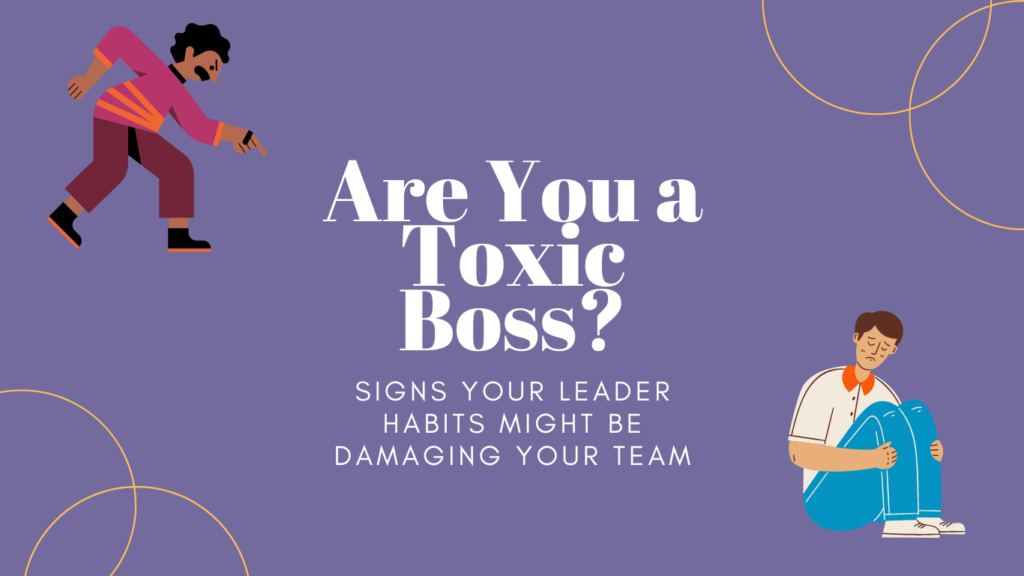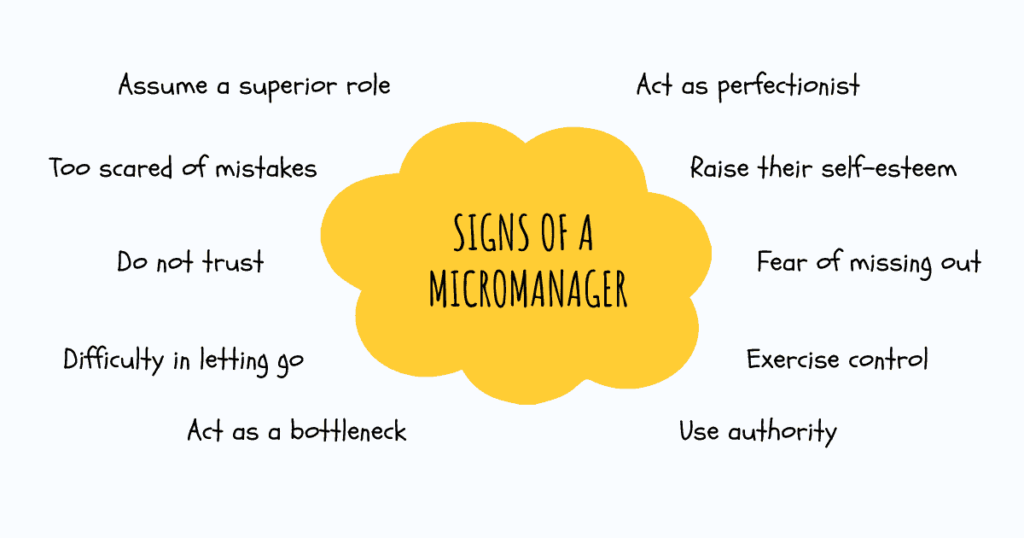Are You a Toxic Boss? Signs Your Leader Habits Might Be Damaging Your Team

Toxic bosses are like the elephant in the room: they exist, but we don’t talk about them, even when we should be. No one deserves to be working under those conditions! Especially, if you’re like most people that spend the majority of your waking hours at work.
It’s important to have a healthy and positive work environment in order to be productive and happy. Unfortunately, not all bosses promote this workplace culture. In fact, some bosses might be the reason why your work environment is so toxic. This blog post will discuss the signs of a toxic boss (fortunately, you haven’t become one!) and how to deal with them.
Stay tuned!

Bad bosses cost companies millions annually in lost productivity, high turnover rates, and decreased morale. In fact, back in 2021, more than 47 million Americans resigned from their jobs as a part of the Great Resignation movement (actually, we have a blog post about this trend, you can read it here.)
The question: WHY?
Employees are quitting their jobs to seek greater pay, better benefits, new opportunities, and safer working environments. Especially, the latter. According to a survey by Real Estate Witch, 31% of workers who quit during the Great Resignation did so because they couldn’t take their company’s toxic culture anymore!

So, what is toxic workplace culture? It’s an environment where employees feel belittled, unappreciated, and stressed out. This type of toxic environment can be caused by several factors, such as bad management, unrealistic expectations, and lack of work-life balance.
But, the most common factor? Toxic bosses! But most important: Are you one of them?
Toxic bosses are the ones that create a toxic work environment. They’re the leaders that use fear and intimidation to get what they want, micromanage their employees, and take credit for their team’s successes. Sound familiar?
Are You a Toxic Boss? Signs Your Leader Habits Might Be Damaging Your Team
We are not here to point our fingers at anyone, au contraire, we want to help improve your workplace, so you can retain your top talent and boost your ROI!
Here are some signs that you or your boss could be on the toxic side:
Sign # One: Micromanaging
Do you find yourself constantly looking over your employees’ shoulders, correcting their every move, and questioning their every decision? If so, you might be a toxic boss. Micromanaging is defined as “a management style whereby a boss closely controls and supervises workers.”
This type of behavior usually manifests in the form of constantly checking in on employees, giving them little to no opportunity to work independently, and being generally skeptical or dismissive of their ideas.

Micromanaging is a toxic habit because it shows a lack of trust in your employees and their abilities. It also creates an environment of fear and intimidation instead of collaboration and creativity.
Employees who are constantly being watched and monitored are never able to fully relax and do their best work
Furthermore, micromanagers typically don’t trust their employees to do the job they were hired to do, which can lead to feelings of frustration and inadequacy.
If you’re currently working for a micromanaging boss, it’s important to take action!
- First, try talking to your boss about your concerns.
- If that doesn’t work, consider looking for a new job at a company where employees are trusted and valued.
But, if you are the one micromanaging, try giving your employees some space and see what they are capable of. You might be surprised!
Sign # Two: Taking Credit for Your Team’s Successes
Taking credit for your team’s successes is a sure sign of a toxic boss. A good leader will always give credit where it’s due, and will never try to take all the credit for themselves.
A toxic boss, on the other hand, will always be looking for ways to take credit for their team’s successes, even if they had nothing to do with it. This kind of behavior creates a highly toxic workplace, where employees are always afraid of receiving credit for their own work.
Taking credit for your team’s successes is a clear sign that you’re not a good leader, and that you’re more interested in self-promotion
If you’re ever in a position where you’re tempted to take credit for your team’s successes, ask yourself whether you’re really doing it for the right reasons. If you’re only interested in self-promotion, then it’s time to learn some collaboration skills.
We have gathered for you “The Skills for Collaboration: What You Need to Know About Working Effectively as a Team” here. Look it up!
Sign # Three Belittle or Public Criticism
Publicly criticizing or belittling employees is a toxic habit that should be avoided at all costs. This type of behavior usually takes the form of humiliating an employee in front of their colleagues, making snide comments about their work or abilities, or putting them down in front of others.
This kind of behavior is toxic for several reasons:
- First, it creates an environment of fear and intimidation instead of trust and respect.
- Second, it shows a complete lack of respect for your employees.
- Finally, it can lead to low morale and high turnover rates.
If you’re currently working for a boss who criticizes you publicly, bring the topic to the table:
- Talk to your boss about your concerns and see if there’s a way to address the issue without quitting or getting fired.
- If that doesn’t work, start looking for a new job at a company where employees are treated with respect.
But, if you’re the one criticizing your employees publicly, try to stop yourself. This type of behavior is toxic and will only damage your relationships with your employees. Instead, try giving constructive criticism in private. This will show your employees that you respect them and value their opinion.
Sign # Four Unrealistic Demands
Toxic bosses often have unrealistic demands on their employees. This can take the form of expecting employees to work long hours with no overtime pay, demanding that they complete tasks that are impossible or unreasonable, or simply putting too much pressure on them without providing adequate resources.
This kind of behavior leads to burnout, frustration, and resentment. It also creates an environment where employees are constantly under stress and feel like they can never do enough
If you’re currently working for a boss who has unrealistic demands, try to negotiate a more reasonable workload. If that doesn’t work, start looking for a new job at a company where employees are treated fairly.
But, if you’re the one making unrealistic demands on your employees, try to be more realistic. This will show your employees that you respect their time and appreciate their work helping to reduce stress levels and improve morale.
Sign # Five You Are Never Wrong
When does “I am the boss” become an analogy for “I am never wrong”?

Toxic bosses often have a hard time admitting when they’re wrong. This can take the form of making excuses, deflecting blame, or simply refusing to admit that there’s a problem.
In addition, bosses who never admit they are wrong often end up making more mistakes. Without feedback from their employees, they are unable to learn from their mistakes and improve their performance.
This kind of behavior creates an environment of mistrust and resentment. It also shows a lack of respect for your employees
If you’re currently working for a boss who never admits when they’re wrong, try to talk to them about your concerns.
But, if you’re the one who never admits when you’re wrong, try to change your behavior. For example, instead of saying “I’m the boss, so I’m always right,” try saying “I value your opinion, but let’s discuss this further.” And try to reflect on your actions.
Sign # Six Make You Doubt Your Abilities and Talents
Toxic bosses often make their employees doubt their abilities and talents. This can take the form of constantly critiquing their work, making them feel like they’re not good enough, or putting them down in front of others.
This kind of behavior is toxic for several reasons:
- First, it creates an environment of fear and insecurity.
- Second, it leads to low morale and high turnover rates.
- Finally, it shows a lack of respect for your employees.
If you’re currently working for a boss who makes you doubt your abilities and talents, try to talk to them about your concerns.
But, if you’re the one making your employees doubt their abilities and talents, try to change your behavior. For example, instead of saying “you’re not good enough,” try saying “I’m sure you’ll do great next time. How can I help you succeed?”
Sign # Seven You’re a Workaholic
Toxic bosses often have a hard time balancing work and life. This can take the form of working long hours, expecting employees to do the same, or putting work above all else.
This kind of behavior is toxic for several reasons:
- Creates an environment of burnout and stress.
- Leads to a lack of work-life balance.
- Shows a lack of respect for your employees’ time.
If you’re currently working for a boss who is a workaholic, don’t hesitate to talk this through. As a human being, you deserve a good work-life balance and to spend time with your family.
But, if you’re the one who is a workaholic, try to change your behavior. For example, instead of working long hours (and dragging your employees along), try taking breaks and leaving on time.
And instead of putting work above all else, try to find a balance between work and life.
Sign # Eight You’re Inconsistent
Toxic bosses often have a hard time being consistent. This can take the form of changing their mind often, making decisions without consulting others, or going back on their word.
This kind of behavior:
- Creates an environment of uncertainty and anxiety.
- Leads to confusion and frustration.
- Shows a lack of direction in your management.
If you’re currently working for a boss who is inconsistent, try to be patient and offer some feedback on how to improve the process of decision-making.
But, if you’re the one who is inconsistent, try to change your behavior. For example, instead of making harsh decisions or making decisions without consulting others, try to involve your employees in the decision-making process.
Boss or Leader?
The times are changing, and employees are no longer interested in being commanded, but in feeling part of the company. In fact, 9 out of 10 people are willing to earn less money to do more meaningful work. Having a purpose is the new money!
The toxic boss culture is quickly becoming a thing of the past as the toxic workplace culture is slowly being left behind. With the rise of the internet and social media, toxic workplaces are no longer able to operate in secrecy, and employees are no longer afraid to speak out about their experiences.
We could even say the “boss” position is being replaced by the “leader” position.
Leaders are people who inspire and motivate others to achieve their goals. They are focused on the collective success of their team, not just their own personal success.
Collaborative working is the future of the workplace!
Final Thoughts
The 21st century workplace is a different place than it was even five years ago. Employees want to feel included and that their work is valuable. They don’t want to feel like they are working in a toxic environment where their boss lords over them with an iron fist.
While it’s impossible to please everyone all of the time, it’s important to be aware of the signs that you might be a toxic boss
If your boss or leader exhibits any of the signs above, it’s time for you to take action. Don’t hesitate to speak up and let them know that their behavior is toxic and not tolerated in today’s workplace.
By changing your own toxic traits, you can become the leader your employees want and create a productive work environment where everyone feels valued. What changes will you make starting today?
We hope you have enjoyed our blog post! Don’t forget to explore our archive for more great information.
-The Monitask Team


